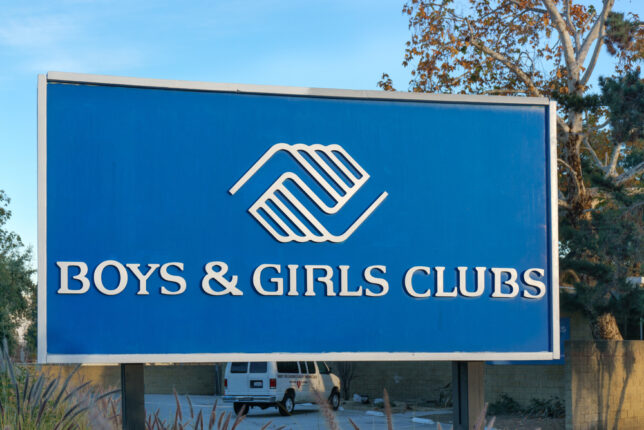Organization Trends
Beware of the Boys and Girls Club
 Credit: Ken Wolter. License: Shutterstock.
Credit: Ken Wolter. License: Shutterstock.

I remember going to the Boys and Girls Club as a kid in the early 1990s. At $5 a year to become a member, it was an extremely cheap and much-needed babysitter for my overworked and tired single mother. There was an indoor swimming pool that offered countless hours of fun, interesting art classes, and tons of games, including my favorite, bumper pool. I will never forget watching Back to the Future for the first time in a room full of rowdy and excited peers.
Of course, the club wasn’t perfect. I used to sneak out with some “bad kids” to buy Taco Bell, and some of the “cooler” staff were okay with kids using curse words, but for the most part, it was the safe and low-cost option my mom needed to keep preteen Kali entertained and out of trouble.
These clubs have transformed from clubs of the happy memories of our youth to something closer to left-leaning sexuality and gender-questioning camps.
Admirable Origins
Like many nonprofits, The Boys and Girls Club has admirable origins and quite a long history in this country. The Boys and Girls Club was founded by a group of Connecticut women in 1860. The women observed gangs of unsupervised young boys hanging out on the streets of their town and wanted to create a club with organized activities for these boys. Thus, the first all-boys club was formed.
By 1931, these boys clubs had opened in multiple states, which cued the National Boys Club of America. In the following years, the clubs slowly incorporated girls, leading to an official name change in 1990 to the Boys and Girls Club of America.
More than 5,000 clubs across the nation now serve around 3.6 million kids. They have marketed themselves as a “safe place” where children can come after school and on the weekends with the mission statement: “To enable all young people, especially those who need us most, to reach their full potential as productive, caring, responsible citizens.”
A Club Transformed
So why have I titled this article “Beware of the Boys and Girls Club” when it has such a seemingly noble mission? Just like I’ve warned about our public schools, it’s time for adult Americans to erase their memories of the Boys and Girls Club and replace them with the image of left-leaning sexuality and gender-questioning camps. These clubs have transformed from clubs of the happy memories of our youth to something closer to the brainwashing of the old Hitler Youth clubs, except now with rainbow flags. I wish I were exaggerating.
Consider some quotes from its official website.
After more than 160 years of serving youth, we know that a sense of belonging is everything, especially for LGBTQ+ kids and teens. Clubs work to foster a safe, positive environment for youth, staff, and families of all sexual orientations, gender identities, and gender expression.
Disturbing Practices
Belonging, safety, and positive environments all sound nice until you flesh out the details of what this means. The site then quotes a teen member, “I can come here and be who I am. At home, there’s always a filter, but here there isn’t. People here are more accepting than where I typically am for most of my day. From my perspective, it seems that it’s the only accepting place.” You’d be forgiven if you saw a striking similarity between the textbook definition of “grooming” and how the club’s website seems to encourage the practice of hiding sexual conversations with minors from their parents. Because grooming is precisely what this is.
There was also a video of an African American teen with they/them pronouns sharing about how his mentor from the club taught him to accept their gender identity and how the Boys and Girls Club provided that “safe place” for them to express themselves. It is ironic how it is still called the Boys and Girls Club. I wonder when they will decide that the name isn’t inclusive enough since they are counseling other people’s children on their gender identities, which now, according to the left, is far more than two. The Genderless Younger Humanoids of America Club? Is mentioning age groups bigoted yet? And definitely cross out the “America” part.
A Rhode Island Chapter of the Boys and Girls Club asked 9–12-year-olds in a survey if they were transgender or non-binary. It gave the 13–18-year-olds a survey about their sex lives, which included the questions “Have you ever had sexual intercourse?” and “How old were you when you had sexual intercourse for the first time?” “During the past three months, with how many people did you have sexual intercourse?” These surveys were given without parental consent. Have I erased your childhood club memories yet? Strangely, I haven’t found the mugshots of whoever was responsible for these online surveys yet. Just kidding, no one is being held accountable.
Then there’s the Boys and Girls Club’s ongoing problem with child sexual abuse lawsuits. A 2020 investigation into the alleged sexual abuse in the clubs uncovered 351 victims in 35 states, in which more than 100 of them led to criminal convictions. Court records show some children were abused in their town’s club for years. Are these clubs the “safe place” we want other people’s children to be secretly mentored on their gender identity and sexual orientation? Judging by the alarming number of sexual abuse cases, they don’t seem like the safest place for these conversations to me.
Ignoring Parents
The Boys and Girls Club is no longer just a fun spot where children can hang out after school while doing extracurricular activities. The clubs now act as replacement parents, especially regarding children’s gender identity and sexuality. Just like the state of our current public schools, this is a violation of parental rights and the autonomy they are supposed to have over their children.

